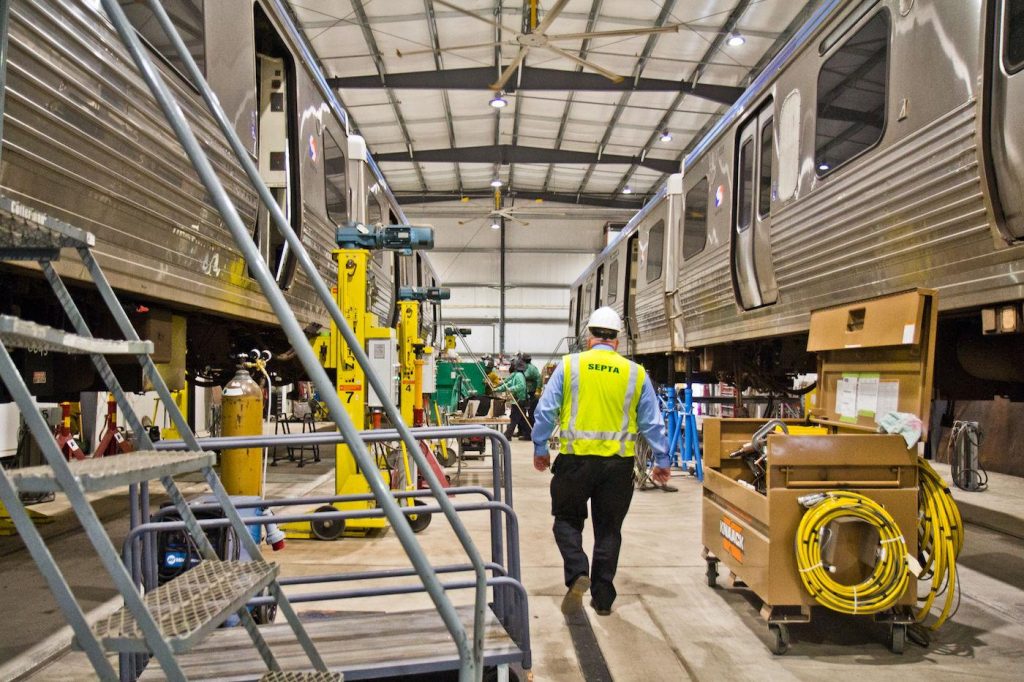Transport workers in Philadelphia’s 5,000-strong TWU Local 234 voted unanimously to strike Sunday afternoon. Those workers run subways, trolleys, and buses in the Southeast Pennsylvania Transportation Authority (SEPTA). The vote Sunday shows the willingness of the rank and file to walk out for their demands as their contract ends and SEPTA management offers them an insulting deal. A strike would begin on November 1 at the earliest — when the current contract runs out.
Apparently not “Heroes” Anymore
The train, trolley, and bus workers were on the front lines as the pandemic raged through southeast Pennsylvania. More than 800 were infected with COVID-19; 11 died. In 2020, the bosses hailed them as heroes.
That was last year. Now, the Authority wants concessions from its workers. It wants to roll back seniority rights for workers who have been running vehicles for decades, increase copays on health insurance, and decrease health coverage for retirees. They’re offering either paltry raises for a two-year contract or no raises over four years.
But for working as “heroes” on the front lines of a deadly pandemic, the union is demanding more. It’s calling for retroactive hazard pay for the risks workers ran, in addition to real increases in pay alongside maintaining current benefits.
And TWU Local 234 is no stranger to strikes. In fact, it’s among the most militant transportation unions in the country, with 12 strikes between 1971 and 2016. But it’s still unclear whether or not the union leaders will in fact lead the workers out on strike.
From Striketober to Strikevember?
Right now, union leaders will use the strike vote as leverage to push for a better contract than what SEPTA bosses are offering right now. But strikes are far, far more important than mere bargaining chips. SEPTA workers are absolutely essential to the entire economic life of Philadelphia. They move its working class people — the people who produce all the bosses’ profits — to and from work. Strikes are a key tool that show that power to the workers themselves — while the bosses at the bargaining table pretend that workers are just one cost among others.
More than this, strikes are a way for workers to use their power over their own working conditions, instead of management dictating those conditions from above. In strikes, the working class flexes its muscles, and starts exploring just how powerful it could be — how it could run the world. And this is one main reason that the bosses, and the politicians of both parties that serve them, hate and fear strikes. Strikes threaten to put their power into question, because that power always rests on the labor of workers.
And more: the strike vote comes on the heels of what’s being hailed as “Striketober,” when tens of thousands of union workers — often those who were “heroes” in the pandemic — have downed their tools: factory workers at John Deere and Kellogg, nurses, and others. Strikes are a chance for the working class and oppressed to stand together, to flex our collective power over the economy — by supporting each others’ strikes: standing on each others’ picket lines, blocking each others’ scabs, and walking out on solidarity strikes for our union siblings.
In other words, a strike should not be a weapon of last resort, and its threat is not only a mere bargaining chip, as our union leaders so often tell us. Instead, strikes are a key way for us to learn our own power, and when we have the leverage and support to win, to show that power, exert it over the bosses who would otherwise use us up and throw us away like trash. And rank and filers can create their own venues — their own mass worker assemblies — to take those decisions into their own hands.
Time to Prepare for Solidarity Strikes
All of this also means that now, as a strike looms, is the chance for union rank and filers across Philadelphia to stand together — to strengthen not just the hand of TWU Local 234, but that of workers across the city.
The teachers’ union, the PFT, has a major role to play. It holds key leverage to help a potential SEPTA strike. The Philadelphia Inquirer points out that “[n]early 60,000 city students rely on SEPTA to get to their schools; many of the district’s 20,000 employees also use public transportation.”
The superintendent of the School District of Philadelphia has already said he’s preparing to force teachers to teach online as a result. This means, in effect, trying to make teachers cross the SEPTA union’s picket line.
But if teachers stop teaching, tens of thousands of teachers will add their own power TWU Local 234. It’s time for PFT to prepare a solidarity strike, and to send its teachers to the SEPTA pickets.
Solidarity strikes like that wouldn’t just strengthen the hand of the SEPTA union leaders. It would also strengthen the power of workers throughout the city. It would set a precedent: when union siblings are on the pickets, you stop working and stand shoulder to shoulder with them. There’s a reason that the bosses put clauses in our contracts forbidding solidarity actions. It’s because they increase the power of workers over the bosses by leaps and bounds.
PFT leaders haven’t said anything about the SEPTA strike, though. Neither, it seems, has the opposition caucus in the PFT, the WE Caucus. Why not?
While SEPTA leaders prepare to negotiate with the Authority, now is the time for rank and filers to decide for themselves to prepare a strike. This is not just a task for bus drivers and trolley and train operators, but also teachers, teacher aides, college professors, and any other union member and worker — to build a mass movement.










